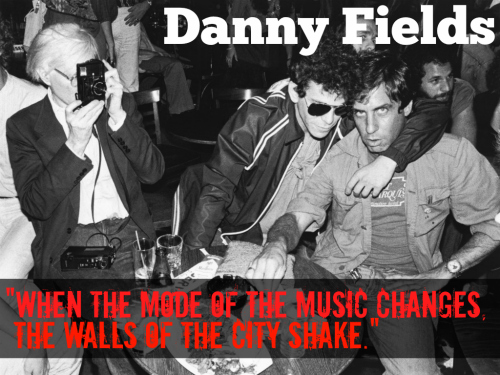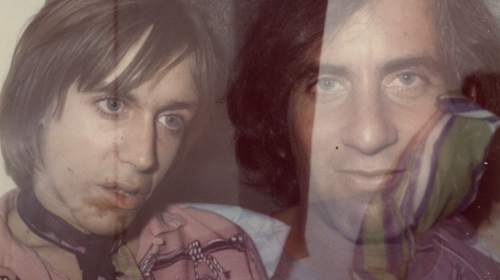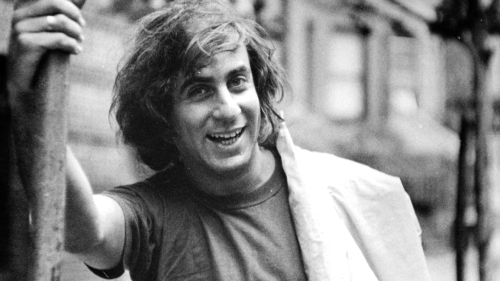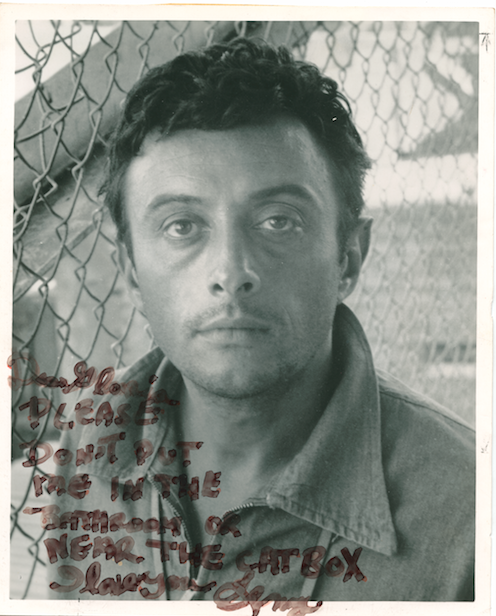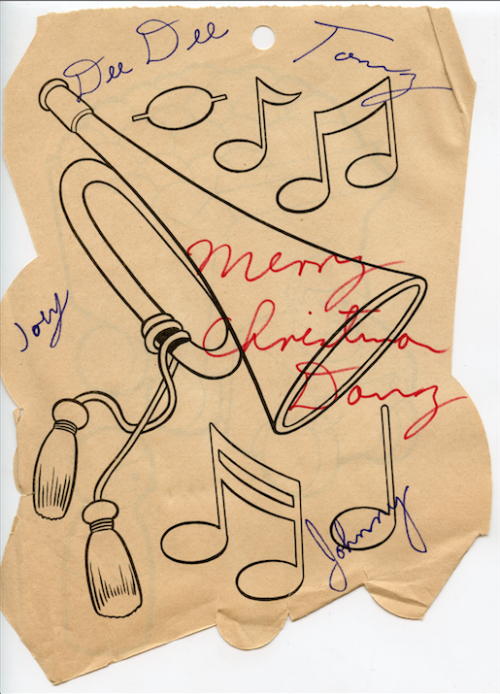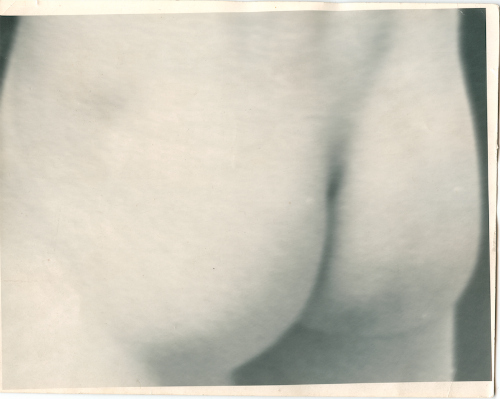Almost a year ago now, I received an email from a reader of this site by the name of Bob Nolan, who, knowing of my love for the Ramones and Stooges, suggested that I talk with a friend of his named Brendan Toller. Brendan, he told me, had been working on a film about Danny Fields, the man who, among other things, got the Stooges signed to Elektra in 1968, and later went on to become the co-manager of the Ramones in 1975. “Brendan’s been spending a lot of time sleeping on Danny’s couch these last few years, just scanning memorabilia and going through tapes,” Bob told me. “And he’s got some amazing stuff that Danny had even forgotten about… a few bombshells.” He went on to say that he didn’t know how much Brendan would want to say before the movie came out, but he passed along his contact information, and a conversation was begun… And, now that the movie is officially out, here’s my discussion with Brendan Toller, the director of the new documentary Danny Says.
MARK: That was some pretty great coverage in the New York Times a few weeks ago. Congratulations.
BRENDAN: Oh, thank you. Quite a nice Christmas miracle.
MARK: How did you first come to know Danny?
BRENDAN: I was working on my first feature documentary, “I Need That Record!”. The film chronicles the indie record store lull of the early 2000s, what made it so, and why these stores are so significant in keeping music culture alive. I interviewed Danny Fields for the film, but we barely graced the subject of record stores in our conversation. There was just too much to be awestruck by. Danny became a fan of “I Need That Record!,” a confidant, and out of that grew a friendship which eventually conceived “Danny Says.”
MARK: Assuming the idea was initially yours, was he immediately receptive to the idea of a documentary about his life, or did it take him some time to warm up to the idea?
BRENDAN: Warhol [seen at the top of the page with Lou Reed and Danny Fields] originally wanted to “tape his life story.” Andy talks about it in his diaries, but he would pass away just months later, in 1987. As for how I approached the idea, I was very calm about it – the ball was in Danny’s court – and, fortunately, he said yes.
MARK: What was it about Danny’s life, if you know, that resonated with Andy? And, when you say he wanted to “tape” Danny’s life story, do you know what he meant by that?
BRENDAN: I can only answer these type of questions with conjecture. I’m not Danny, I’m Danny’s Boswell. I think it may have been at a point where Andy’s life (late 80s) had been far removed from the excitement and whip-it-up Factory days of the mid-60s. Danny probably brought a lot back to him in that short instance of running into him late one night at a party for Dolly Parton.
MARK: I’ve yet to see the film, but Bob mentioned to me that you had unearthed a few “bombshells.” Did any of them make it into the finished film?
BRENDAN: Finding the tape of Lou Reed listening to the Ramones for the first time with Danny was a jaw-dropper. There are also a good number of phone conversations, from ‘between ‘68 and ’71, of Danny and Iggy, that are just mind-blowing. Same goes for Nico. Danny’s photography is also incredible. Of course, Danny’s recollections are so vivid, punctuated with humor and brilliant word-play. He holds nothing back. It’s a cliche, but “Danny Says” is a film that no one’s seen or heard before, truly. [Below: Iggy Pop and Danny Fields]
MARK: Can you give us a sense of one of these taped conversations with Iggy? Is there a specific exchange that comes to mind?
BRENDAN: There’s a full tape of Iggy playing the rough mixes of Funhouse over the phone to Danny. An edited version can be heard in the film.
MARK: Assuming all of these taped conversations between Danny and the likes of Iggy and Nico didn’t make it into the finished film, is it conceivable that you might be releasing them in some other format? I’m thinking, for instance, that it might help drive attention to the film if you started releasing them online, right?
BRENDAN: Yes, probably on the soundtrack, if one happens. And perhaps in short form online videos.
MARK: I’m just imagining how awesome they could be animated… I’m thinking of that piece that was done a few years back with audio of LBJ buying slacks over the phone.
BRENDAN: That’s hilarious!
MARK: What was the most difficult thing for you to cut from the film?
BRENDAN: Danny yelling at Bob Rudnick for talking about the potential of Elektra signing the MC5, Danny hearing an acetate of “A Day In The Life” with Eric Anderson and Brian Epstein at the Waldorf, Danny’s aunt Ruth, Cream, and rememberances of Monterey, Woodstock and Altamont. I could have made three films.
MARK: Damn. That all sounds incredible… Was Danny in the habit of recording all of his conversations?
BRENDAN: Yes, it was a Warhol practice – they are a treasure!
MARK: I knew that Warhol was in the habit of documenting conversations, but I wasn’t aware that others in the scene had taken it up as well. Just how long did Danny do this? How many tapes did you have to make your way through?
BRENDAN: Let’s just say it took me two years, on and off, of digitizing. The dates range from ’68 and beyond. [Below: Danny Fields]
MARK: I know I should ask about the events surrounding Danny’s listening to “A Day In The Life” with Brian Epstein, but I’m intrigued by the fact that you’ve included “Danny’s aunt Ruth” in this long list of incredible, important moments in rock and roll history, and I have to ask… What’s so great about the “aunt Ruth” interview?
BRENDAN: We interviewed Danny’s aunt Ruth in New Jersey. A real deal yenta. She had very funny observations about Danny being an opinionated child from age three. “The only place to buy clothing for men is Brooks Brothers. And if you can’t afford it, you should arrange [your life] so you can afford it.” Proves that, like Danny says, “You’re only born with what you got” in a certain sense.
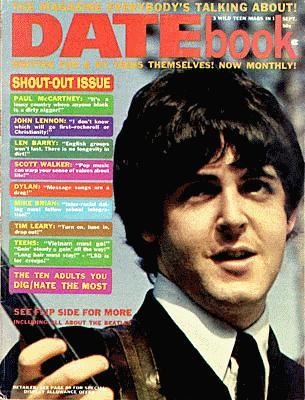 MARK: Speaking of the Beatles, Danny claims to have been at least partially responsible for their breakup, given that it was his decision, as editor of the teen magazine Datebook, to play up John Lennon’s “(We’re) more popular than Jesus” quote in 1966, bringing it to the attention of folks in the Bible belt. Danny feels as though this act of his led to the protests and death threats against the Beatles, which ultimately led to their decision to stop touring, and their decision to break-up. Is that, in your opinion, the story of a life-long PR man looking to insert himself into rock and roll history, or do you think he really feels as though he brought about the downfall of the Beatles?
MARK: Speaking of the Beatles, Danny claims to have been at least partially responsible for their breakup, given that it was his decision, as editor of the teen magazine Datebook, to play up John Lennon’s “(We’re) more popular than Jesus” quote in 1966, bringing it to the attention of folks in the Bible belt. Danny feels as though this act of his led to the protests and death threats against the Beatles, which ultimately led to their decision to stop touring, and their decision to break-up. Is that, in your opinion, the story of a life-long PR man looking to insert himself into rock and roll history, or do you think he really feels as though he brought about the downfall of the Beatles?
BRENDAN: To say Danny broke up the Beatles is, as Danny says, “to sell a candybar in twenty words or less.” He got the ball rolling, he got the conversation started. By ‘66, people in the public eye were starting to get in trouble for saying the right things. The 60s, as we now know them, were starting to emerge through the expression of artists like Bob Dylan and Lenny Bruce – provocateurs in a sense. Danny was publishing front-page headlines like, “It’s a country where anyone black is a dirty nigger” [Paul McCartney on the United States], or “Message songs are a drag” [Bob Dylan], to stoke the fire. Unfortunately, it was too much too soon, and, as with most situations in his life, Danny was way ahead of his time. Politically-revealing headlines are rarely seen on the newsstands, nevermind on the covers of a magazine geared toward 11-year-old girls in the 1960s. Danny’s spent his life defining a platform for the fringe. In ‘66, the Beatles were the biggest band in the world, but what about the Who? The Kinks? The Byrds? The Velvet Underground? Danny has always shined a light on the outre and obscure.
MARK: Regardless of his culpability in the breakup of the Beatles, it makes for a great story that the man who gave us the Ramones and Stooges also killed the Beatles… And, who knows, maybe we wouldn’t have had the Ramones or the Stooges had the Beatles kept making records. Maybe one thing had to happen to make room for the other.
BRENDAN: Danny always encouraged those that he admired and gave artists authority to tip the mainstream in an immensely influential way. The Beatles influenced a wave of kids to pick up guitars, but now it seems the Stooges, Ramones and Velvets are the template for contemporary music – a second wave. [Below: Danny Fields and the Ramones]
MARK: Danny, by all accounts, was a brilliant young man. Assuming the historical record is correct, he was already at Harvard Law at 20, when he decided to drop out and return to New York. (Some sources give the year of birth his as ‘39, while others give it as ‘41.) Assuming you asked him, I’m curious as to why he dropped out and moved back to New York when he did. What was happening at that time, around 1960, that pulled him back? As he’s often credited with being one of the first publicly gay men in the music business, my guess is that it had something to do with the acceptability homosexuality within the New York arts scene, but I suspect there may have been other factors.
BRENDAN: Boys. Greenwich Village. Fabulous people versus monotonous work that would ultimately lead to a lucrative, but rather dull existence in all likelihood. As for Danny being out, he was never in. Sexuality never defined him as it defines so many today… The sooner we can get away from phrases like, “Oh, meet my friend Charlie, he’s gay,” the better. Independent thought, defiance, humor and (even on the shallow end) physical features are more interesting than sexual preference. There was a secret camaraderie amongst people who gravitated towards members of the same sex in New York for sure, but let’s also not forget it was illegal. People were arrested.
MARK: Is it upon returning to New York that he changed his name from Daniel Feinberg to Danny Fields? Did he talk with you at all about why he decided to make that change?
BRENDAN: Danny started work for a theater PR man and decided he was beginning a life in show biz. Gracie Fields. W.C. Fields. It was that, and to signify a break from the values of his parents, their morals and expectations. He was leaving the ivy life.
MARK: I’m not trying to make a comparison between the two, as Danny was clearly operating a much different level, but I recently watched the documentary Mayor of Sunset Strip about LA radio personality Rodney Bingenheimer, who seems to have had a knack for being at the right place at the right time and facilitating connections between people in the indusry, and I was wondering if there might be some commonality between the two men. Bingenheimer, as I suspect you know, was obsessed by celebrity, and was drawn to the music industry because, although he wasn’t a musician, he was compelled to be a part of it… And I’m just curious if there’s any of that motivating Danny. And, by saying that, I’m not suggesting that he was just a glorified groupie. He clearly wasn’t. But my sense has always been that that he was more a fan than just an industry guy who saw an opportunity to make money off of these people. Would I be wrong about that?
BRENDAN: “Mayor of the Sunset Strip” is a great doc! I think Danny was motivated to be in approximation of fabulous people that surprised and stunned with their talent or beauty. He has a knack for seeing someone’s potential. His medium is people really. There are many in his orbit who never blossom, but those who have, with his prodding and confidence, have made miracles. Iggy is a miracle a hundred times over.
MARK: What would have happened with Iggy, do you think, if not for Danny?
BRENDAN: I think he may have been the “forgotten boy.” I mean, literally Search and Destroy, one of the great rock ‘n’ roll songs of all time, would not exist if Danny had not insisted that Iggy meet Bowie.
MARK: I wasn’t aware that it was Danny that made that introduction.
BRENDAN: Paraphrasing the film… Iggy was watching Mr. Smith Goes to Washington
MARK: In ‘68 or so, Danny became a DJ at WFMU, and it was there, according to legend, that he was told by another DJ that he had to check out the scene around Detroit, setting in motion a chain of events that would bring both the MC5 and The Stooges to the national stage. I’m curious as to what he may have told you about that first trip he took to Ann Arbor / Detroit.
BRENDAN: Danny had actually been out to Ann Arbor previously. He wrote a bad check to follow the Velvet Underground. Danny saw the Velvets play the Student Union Ballroom at the University of Michigan, where, just years later, he would see the Stooges for the first time. He was tipped off by Bob Rudnick and Dennis Frawley, who had a show called Kokaine Karma on WFMU, that the 5 were a hot band. I know Danny was taken aback by the energy and endless will of John Sinclair and the 5; barking orders off the toilet, women serving men food, pounding on the tables like Vikings, printing presses. It was its own self-contained focused, politically-driven, hype machine years before bands did all their copy and publicity. [Below: Danny Fields and the MC5]
MARK: I’d known that Danny and Warhol were acquintances, but I wasn’t aware that he’d made the trip to Ann Arbor with the Exploding Plastic Inevitable. When did Danny and Warhol become friends?
BRENDAN: Danny met Warhol at the San Remo bar. Every group of people had a name. Danny was in the YJS – the Younger Jewish Set.
MARK: That was Warhol’s designation?
BRENDAN: I’m not sure whose designation it was.
MARK: Speaking of the Warhol crew, do I also understand that Danny was roommates with Edie Sedgwick during some of this period?
BRENDAN: Yes, Edie came down from Cambridge with her best friend Tommy Goodwin. She crashed a few nights with Danny and just stayed for a few months. It was an interesting time… They were bringing down first batches of Timothy Leary’s acid – keeping bottles in Danny’s refrigerator to drop on sugarcubes.
MARK: Back to the Stooges, what, if anything, did Danny tell you about that first show that he saw in Ann Arbor?
BRENDAN: When the mode of the music changes, the walls of the city shake.
MARK: I’ve heard Danny say in other interviews that Iggy was pissed at him for listing him as “Iggy Stooge” on the first Stooges album.
BRENDAN: Danny claims that wasn’t his doing. But, yes, Iggy told us he was pissed for Iggy Stooge.
MARK: According to accepted Ramones history, it was Dee Dee’s idea to take the surname “Ramone.” The story goes that he did it first, and then convinced the others to follow suit. Given that Iggy thinks it was Danny who stuck “Stooge” on the end of his name, however, I wonder if he may have played a role in it. Do you know if the taking of the “Ramone” surname predated Danny’s tenure as their manager?
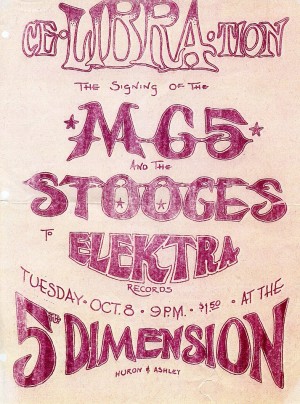 BRENDAN: Danny denies that he had anything to do with giving them all the Ramones surname, but Iggy thinks he may have had something to do with it. The Ramones were very clear-cut, uniform, both in their music and the way they dressed. It made total sense for everyone to have the same last name, so who knows when and how it was instated… they were already headed down that road.
BRENDAN: Danny denies that he had anything to do with giving them all the Ramones surname, but Iggy thinks he may have had something to do with it. The Ramones were very clear-cut, uniform, both in their music and the way they dressed. It made total sense for everyone to have the same last name, so who knows when and how it was instated… they were already headed down that road.
MARK: I’m curious as to how Danny approached the Ramones about becoming their manager, and how Linda Stein, the wife of Sire Records head Seymour Stein, came to be their co-manager. How, if you know, did that arrangement come about? I’m curious about their relationship as co-managers.
BRENDAN: Legend has it Danny saw them perform at CBGB’s to get them to stop calling him at 16 Magazine and Soho Weekly News, where Danny was stoking the fires at the time. With a name like the Ramones, he assumed they were a little south of the border. After the 20-minute set, he took them out onto the sidewalk and asked to be their manager. The Ramones needed new drums, so Danny flew to Florida and asked his mother for $3,000. Danny knew Linda Stein from chasing Elton John for 16 Magazine. Elton was a bit uncooperative with photos and material so he befriended Linda, who was Elton’s confidant. Danny knew Linda liked rock ‘n roll and Linda convinced Seymour to sign them to Sire. I never met Linda, but I hear Danny and her were like brother and sister; in touch almost everyday for 30 some odd years until her tragic death. Linda Stein did more for the Ramones than we’ll ever know.
MARK: Was it Danny’s idea to take the Ramones to England in ‘76, changing the course of history forever?
BRENDAN: I’m sure he was all for it, but I’m guessing the idea and insistence came from Seymour Stein’s international guise.
MARK: I don’t know what I’m basing this on, but my sense is that Danny perceives his biggest failure in life to be the fact that they Ramones never had a hit. Is that the case?
BRENDAN: I don’t know if Danny measures his life in greatest or worst anything. You wake up and deal with what greets you everyday. Danny certainly tried his best to get the Ramones in the best position possible. Hits are illusive and the first to march to war are always the first to get shot down.
MARK: At what point was the decision made for Danny to leave the Ramones, and how painful was it?
BRENDAN: The Ramones fired him. They wanted a radio hit and thought they had better options with another manager.
MARK: In addition to the Ramones’ song Danny Says, where else has Danny cropped up in pop culture? I’ve refused thus far to see it, but does he show up as a character in the recent film about CBGBs?
BRENDAN: I think Danny Says was probably the most public nod to Danny Fields. He did write the liner notes to the original Hedwig movie soundtrack. No cameos in the CBGB film. I thought the CBGB film was pretty funny.
MARK: I don’t want to spend too much time talking about the Doors, who Danny also worked for as a publicist, as I’d rather talk about the Stooges and the scene at CBGB, but I’ve heard on few occasions that Danny hated Jim Morrison. During your time with him, did you get to the heart of that? What was it that made them dislike Morrison? Or, if it’s not true, why is it that this idea continues?
BRENDAN: Again, more Boswell conjecture. I think Jim Morrison was an asshole in the presence of Danny Fields. There are many stories. Some detailed in the movie, some not. There’s one story where Jim pissed in a wine bottle at Max’s Kansas City and gave it to a waitress. “Oh, the wine tastes so good tonight, why don’t you take it home with you, from me?” I think Danny, as his press agent, didn’t appreciate Jim’s rather difficult persona. This was a star the public had never seen before. Weird, dark, twisted, sexy. Jim wanted to be known as a poet first, which is, er, a little hard to market when you have this incredibly sexy wild frontman in a rock ‘n’ roll band… I also think Danny thought his poetry was quite sophomoric and inane.
MARK: Having spent several years having gone through Danny’s archives, I’m curious as to what your favorite artifact was.
BRENDAN: A Ramones x-mas card to Danny. The enlarged pic of Fred Sonic Smith’s tush. The potential Lenny Bruce photograph/suicide note. There’s too many to name. There was a point where I was so stunned, I wasn’t shocked by anything anymore. [Below: Lenny Bruce’s note to 16 Magazine’s Gloria Stavers]
MARK: I hear that a lof of Danny’s collection is now moving to an archive somewhere.
BRENDAN: Yale University. What Danny calls “the sexiest of all American universities.”
MARK: I’ve heard that Danny has told reporters he has no desire to see the finished film. Why do you think that is, and does it bother you at all?
BRENDAN: Danny gave me complete access to interview anytime, obsessively comb the archives, talk to his friends– the entire film is carried by his voice. But not many people love seeing themselves on screen exactly. I’m sure he’ll see a completed version.
MARK: You launched a $20,000 online fundraising campaign to make Danny Says happen. What was that process like, and what did you learn, having gone through it?
BRENDAN: Crowd-funding is a 24/7 job. Proceed with caution. It was a rollercoaster. We had great support from Kickstarter, Village Voice, Flavorwire. Judy Collins put us over the goal. Serendipitous because the first time she met Danny she sort of saved him from a bad acid trip. So thank you Judy for saving our Kickstarter with just days left! [Below: The Ramones’ Christmas card]
MARK: So, what’s next for you and the film? Have you secured any kind of distribution?
BRENDAN: We’ll announce some official screenings very soon. It’s a thrill. And, in terms of distribution, we’re free agents at the moment.
[Note: With the exception of the Datebook cover, all images in this post come courtesy of the Danny Fields Archive, including the following, which is an image of Fred Sonic Smith’s butt]
